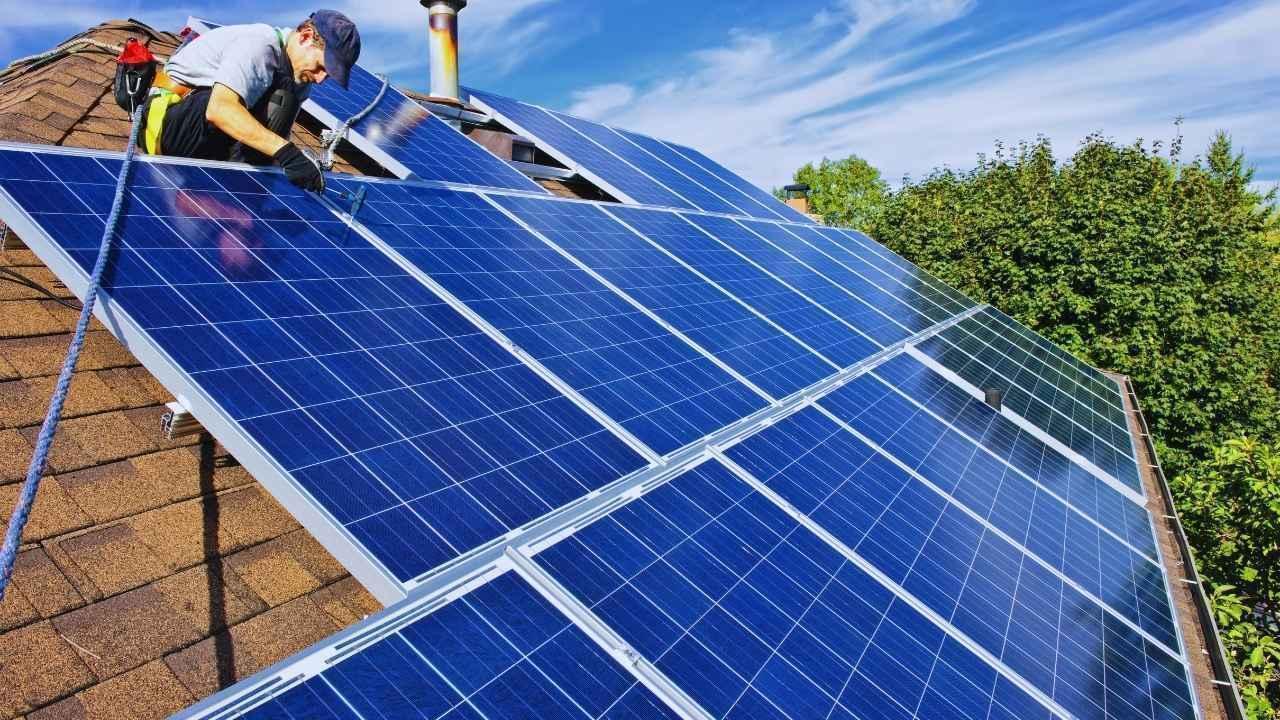
Join 10k+ people to get notified about new posts, news and tips.
Do not worry we don't spam!

Post by : Anis Farhan
In recent years, India has been undergoing a powerful transformation toward sustainability. The combination of rising environmental awareness, government initiatives, and innovation in green technologies has paved the way for a cleaner, more responsible lifestyle. Solar energy adoption, the surge of electric vehicles, and the expanding zero-waste movement are not just trends but reflections of a nationwide shift. Together, they represent India’s evolving journey toward a future where eco-friendliness is not a choice but a necessity.
Solar power has moved from being a niche option to a mainstream energy solution in India. With abundant sunlight across most regions, the country has immense potential to harness solar energy for domestic and industrial needs. The Indian government’s ambitious solar capacity targets have pushed both large corporations and everyday households to look at solar rooftops as reliable alternatives to conventional electricity.
The adoption of solar is driven by both economics and environmental concerns. Rising electricity costs make solar panels a cost-effective option for middle-class families. On the industrial front, corporations are investing in solar plants to reduce long-term energy expenses while also aligning with global sustainability standards. The expansion of solar parks across states like Rajasthan, Gujarat, and Tamil Nadu is proof of the country’s growing appetite for renewable energy.
Beyond cost savings, solar adoption is empowering rural communities. In villages where electricity access was unreliable, small-scale solar grids are providing consistent power for schools, hospitals, and small businesses. For millions, it is more than a power source—it is an enabler of education, health, and livelihood.
The rise of electric vehicles (EVs) marks another chapter in India’s green revolution. What was once seen as a futuristic concept has now become a mainstream reality. Two-wheelers and compact cars dominate the EV market, catering to India’s urban middle class. From delivery partners using e-scooters to commuters choosing electric cars, the adoption is visible on the roads of major cities.
Government policies have played a key role in pushing EV adoption. Subsidies, tax benefits, and the expansion of charging infrastructure have given buyers confidence to make the switch. Manufacturers, both domestic and international, are competing to introduce affordable EV models suited to Indian roads and driving habits.
The environmental benefits of EVs are significant. Cities struggling with air pollution, like Delhi and Bengaluru, are seeing EV adoption as a solution to reduce harmful emissions. For logistics and public transport, EVs are also proving cost-effective in the long run. With more charging stations being installed across highways and urban areas, the range anxiety once associated with EVs is gradually fading.
While solar and EVs address energy and transport, the zero-waste lifestyle is reshaping how Indians think about consumption. The zero-waste movement emphasizes reducing single-use plastics, recycling household waste, and adopting sustainable alternatives. From steel straws and cloth bags to composting food waste, small lifestyle changes are finding big acceptance in urban households.
The younger generation, particularly millennials and Gen Z, are at the forefront of this change. Social media campaigns, eco-influencers, and awareness programs have sparked interest in living responsibly. Cafés and restaurants are switching to biodegradable packaging, while local stores are embracing refill stations for grains, oils, and cleaning products.
This shift is not just about individual responsibility but also about community action. Zero-waste communities in cities like Pune, Bengaluru, and Hyderabad are creating models where neighborhoods collectively manage waste, compost biodegradable matter, and promote recycling. These grassroots movements highlight how sustainability starts at home and extends to the wider community.
One of the strongest forces behind these trends is government support. India has set ambitious targets for renewable energy capacity, EV adoption, and waste management. Programs like the National Electric Mobility Mission, FAME (Faster Adoption and Manufacturing of Hybrid and Electric Vehicles), and the Swachh Bharat Mission are laying the groundwork for a sustainable future.
Solar panel subsidies, incentives for EV buyers, and campaigns against single-use plastics show how government intervention is making green practices accessible. Municipal corporations across major cities are also investing in waste-to-energy plants, recycling centers, and composting initiatives to align with sustainability goals.
By linking green practices with economic benefits, the government is encouraging industries and individuals alike to embrace sustainability.
Despite impressive progress, the transition to a greener India faces hurdles. The high upfront cost of solar panels and EVs remains a challenge for many households. While subsidies ease the burden, affordability is still a major factor.
Infrastructure also needs further strengthening. Rural areas still lack widespread EV charging facilities, and waste segregation systems are not consistent across all cities. Cultural habits, such as the use of plastics for convenience, are deeply ingrained and require long-term behavior change.
Moreover, while renewable energy is expanding, reliance on coal and traditional sources continues to dominate India’s energy mix. Balancing economic growth with sustainable practices is a tightrope that the country must navigate carefully.
Corporations in India are stepping up to play their part. From IT giants powering offices with solar to automobile companies investing heavily in EV production, industries recognize that sustainability is no longer optional. Green credentials are also becoming important for global competitiveness, as international investors and consumers favor environmentally responsible businesses.
On the community front, grassroots organizations and citizen groups are driving awareness and adoption. Initiatives like zero-waste festivals, eco-friendly housing complexes, and educational workshops are influencing collective action. Schools and universities are also teaching students to value sustainability from an early age, ensuring the next generation is prepared for eco-conscious living.
Technology is playing a transformative role in India’s green movement. Innovations in battery technology are making EVs more efficient and affordable. Solar panel efficiency is improving, ensuring more power generation in smaller spaces. Waste management startups are creating apps that connect households with recycling services and composting centers.
Artificial Intelligence (AI) and data analytics are also helping optimize energy consumption in buildings and industries. Smart meters, solar-powered IoT devices, and AI-driven traffic systems are combining environmental responsibility with modern convenience. These innovations highlight how India’s green revolution is as much about technology as it is about lifestyle choices.
The direction India is heading in is clear—toward a greener, more sustainable lifestyle. Solar power will become even more integral as costs fall and efficiency rises. EV adoption is expected to accelerate with the rollout of more affordable models and better infrastructure. The zero-waste movement will continue spreading from urban centers to smaller towns and rural areas, reshaping the way Indians consume and dispose of products.
By 2030, India could well be a global leader in renewable energy and sustainable practices. With its vast population, every small step toward sustainability creates a large impact. The combined efforts of individuals, industries, and the government promise a future where eco-friendly living is not a trend but a way of life.
This article is for informational purposes only. The perspectives shared reflect general trends and insights on India’s green movement. Readers are encouraged to verify specific policies, costs, and practices before making personal or business decisions.










Paramount+ to Stream PBR’s 'Unleash the Beast' in New Five-Year Deal
Paramount+ will stream PBR’s 'Unleash the Beast' across the U.S. starting this December under a five

Zohran Mamdani Clinches NYC Mayoral Seat as Victory Speech Blends Politics and Bollywood
Zohran Mamdani won New York City's mayoral race, becoming the city's first Muslim and South Asian ma

India Wins First Women’s World Cup 2025 Title
India lifts its maiden Women’s World Cup 2025 title! Harmanpreet Kaur’s team stuns South Africa in a

Manuel Frederick, 1972 Olympic Bronze Goalkeeper, Dies at 78
Manuel Frederick, a member of India’s 1972 Olympic bronze hockey team, has died in Bengaluru at 78 a

Muhammad Hamza Raja Wins IFBB Pro Card Puts Pakistan & UAE on Global Stage
Pakistani bodybuilder Muhammad Hamza Raja earns IFBB Pro Card in Czech Republic, showcasing Dubai’s

Shreyas Iyer’s Recovery Underway After Spleen Laceration in Sydney ODI
Shreyas Iyer is recovering after a spleen laceration sustained while taking a catch in the Sydney OD